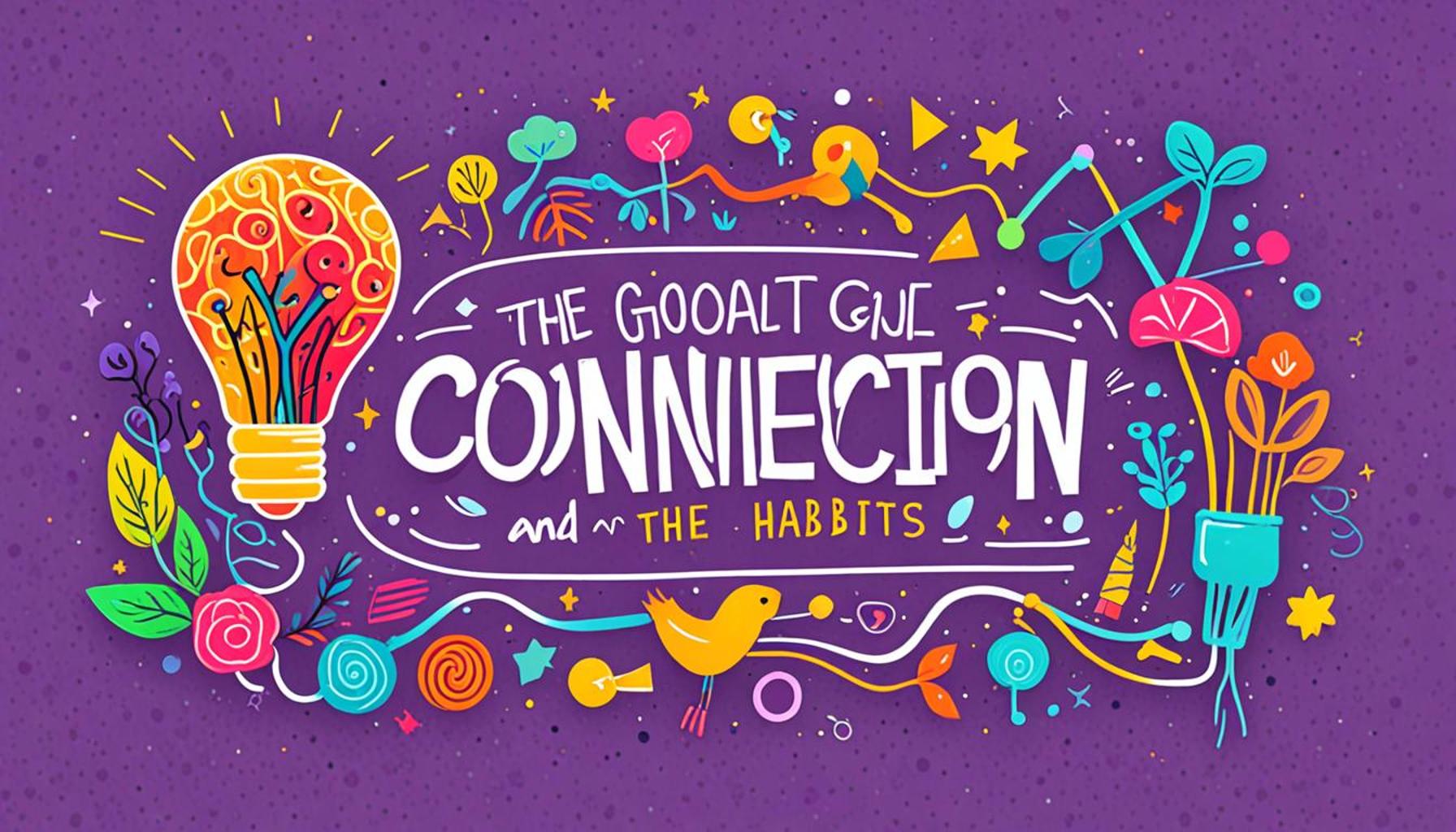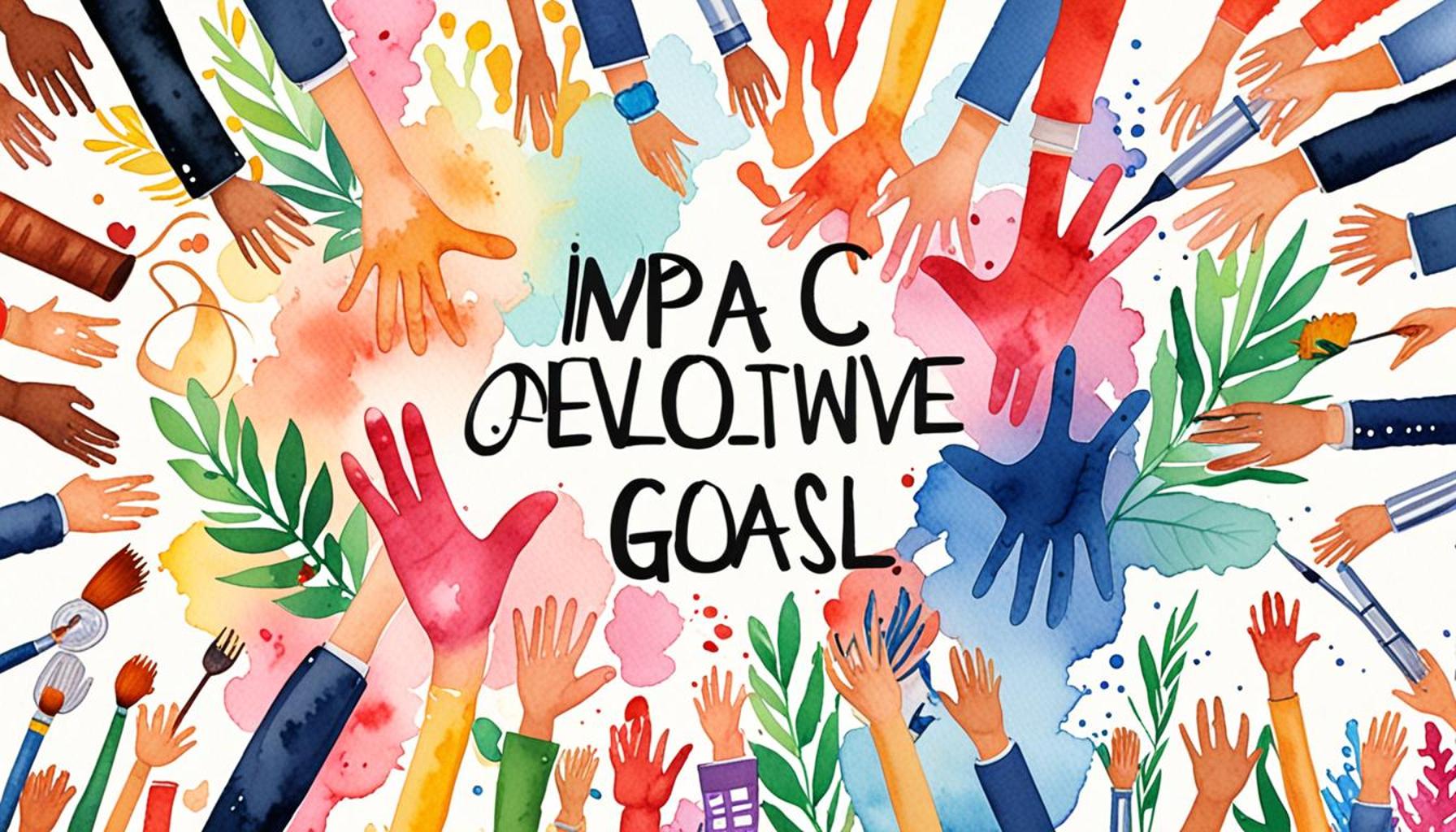The connection between goal setting and the formation of positive habits for a growth mindset

The Essential Relationship between Goals and Personal Growth
Goal setting acts as a powerful catalyst for personal and professional growth, functioning as a vital roadmap that directs individuals towards their desired achievements. In this context, positive habits represent the daily actions and routines that play a crucial role in actualizing these aspirations. For individuals navigating the dynamic landscape of Nigeria, where aspirations are high and opportunities abound, the intersection of goal setting and healthy habits takes on even greater significance.
When individuals establish clear and specific goals, it sharpens their focus and heightens their motivation. For instance, a young entrepreneur in Lagos aiming to start a tech business may decide on a goal to secure funding within six months. This clarity allows them to concentrate their efforts on networking, refining their business plan, and seeking mentorship opportunities—all steps that guide them toward their ultimate objective.
The process of habit formation is critically tied to the consistency of actions that align with these clearly defined goals. As individuals engage in small, daily practices—such as dedicating one hour each day to learning about emerging business technologies—they cultivate habits that enhance their expertise and build confidence. This gradual but steady commitment fosters a sense of discipline, making it more likely for individuals to achieve their milestones and long-term ambitions.
A growth mindset further enriches this landscape by embracing challenges and learning from setbacks. Nigerians are increasingly recognizing the value of resilience in their endeavors. For example, a student facing difficulties in academics may view their struggles not as barriers but as learning opportunities, adopting new study techniques or seeking additional help. Such resilience is vital, especially in a context where economic fluctuations can pose substantial challenges.
Research consistently shows that individuals proficient in goal setting are more inclined to develop sustainable habits necessary for long-term achievement. This constructive relationship propels them towards cultivating a culture of continuous improvement and adaptability, essential qualities in today’s fast-paced world.
By examining the intricate interplay between goal setting and habit formation, one gains valuable insights into how intentional actions can profoundly influence one’s mindset. Are you prepared to explore how these principles can be integrated into your own path toward personal success, ultimately reshaping your outlook and enhancing your potential for growth?
ADDITIONAL INSIGHTS: Expand your understanding here
Unraveling the Dynamics of Goal Setting and Habits
The fusion of goal setting and habit formation is a cornerstone in the establishment of a growth mindset, especially in the context of Nigeria’s vibrant yet complex socio-economic environment. As individuals embark on their personal or professional journeys, the clarity and specificity of their goals can significantly transform their day-to-day actions and ultimately their overall trajectory.
At its heart, goal setting is about defining one’s purpose and direction. It involves identifying what truly matters and striving for it through measurable and tangible steps. During the process, individuals may encounter challenges that test their determination and resilience. However, those who approach their goals with a growth mindset view these challenges as opportunities to learn rather than insurmountable obstacles. For instance, a Nigerian graduate aiming for a career in engineering may set a goal to improve their technical skills by enrolling in online courses and seeking internships. This proactive approach not only delineates a clear path but also integrates learning into their daily routine.
To better understand this interplay, consider the following components that illustrate the link between goals and habit formation:
- Intentional Actions: Every goal necessitates actionable steps. By breaking down larger objectives into smaller, manageable tasks, individuals can instill habits that guide them toward achieving their dreams. A writer, for instance, might commit to penning a certain number of words daily, gradually forming a routine that enhances their writing skills.
- Consistency: Consistency is the bedrock of habit formation. When individuals make it a point to consistently engage in actions aligned with their goals, they reinforce positive behavior. A business owner in Nigeria focusing on customer relationships may set a goal to connect with clients consistently through follow-up emails or personal visits.
- Accountability: Setting measurable goals encourages individuals to hold themselves accountable. This reflective practice can lead to the cultivation of habits that support their aspirations. Joining groups or partnerships can serve as additional accountability mechanisms, helping individuals stay committed to their objectives.
Moreover, the concept of a growth mindset fosters an environment where individuals are not afraid to experiment with new strategies. In Nigeria, where innovation and adaptability are crucial for navigating the competitive job market, this mindset encourages the exploration of various approaches to achieve personal and professional goals. By viewing failures as integral components of the growth process, individuals are more likely to develop resilience and innovative thinking.
Indeed, research underscores that successful goal setting often results in the formation of positive habits necessary for sustained success. This dynamic relationship not only encourages individuals to pursue growth but also offers an opportunity for collating collective experiences and knowledge, further enriching the community. As a result, understanding how to effectively set goals and cultivate habits can significantly influence one’s potential for personal success in the ever-evolving landscape of Nigeria.
The Connection Between Goal Setting and Positive Habits for a Growth Mindset
Exploring the intricate relationship between goal setting and the formation of positive habits reveals critical insights into enhancing a growth mindset. At its core, goal setting provides a framework for identifying desired outcomes and the steps necessary to achieve them. This clarity fosters a sense of ownership, as individuals begin to visualize their path toward success. Moreover, the act of setting specific, measurable, achievable, relevant, and time-bound (SMART) goals encourages the development of routines that reinforce progress. For instance, someone aiming to improve their physical fitness may set a goal to exercise three times a week, gradually creating a habit that contributes to a healthier lifestyle. This consistency not only cements the habit but also builds self-efficacy, as individuals witness their progress over time.Equally important is the role of reflection in this process. Regularly evaluating progress towards goals allows individuals to adjust their strategies, fostering resilience—a key component of a growth mindset. When setbacks occur, reflecting on these experiences in the context of one’s goals helps transform failures into learning opportunities, reinforcing the notion that challenges are integral to growth.By integrating goal setting and habit formation, individuals can cultivate an environment that promotes continuous personal development. This symbiotic relationship not only enhances motivation but also nurtures intrinsic qualities essential to a growth mindset, enabling individuals to navigate life’s challenges with greater confidence and determination.
| Category | Description |
|---|---|
| Goal Setting | Establishing clear objectives to guide actions and behavior. |
| Habit Formation | Developing consistent routines that support personal growth and achievement. |
| Reflection | Analyzing progress towards goals to enhance motivation and adaptability. |
| Resilience | Transforming challenges into opportunities for growth and learning. |
By delving into these interconnected aspects, readers can uncover effective strategies for fostering a resilient and growth-oriented mindset, empowering them to achieve their aspirations.
SEE ALSO: Click here to read another article
The Role of Environment and Social Influence in Goal Setting and Habit Formation
Another multifaceted aspect of the relationship between goal setting and the establishment of positive habits is the influence of one’s environment and social circles. In Nigeria, where community and familial ties often play a pivotal role in individual aspirations, understanding how social dynamics shape goals can enhance habit-forming processes necessary for a growth mindset.
Individuals who surround themselves with supportive and encouraging peers are more likely to set ambitious goals and pursue them with determination. This phenomenon, often referred to as social contagion, illustrates how the behaviors and attitudes of those within an individual’s community can significantly impact their goal-setting endeavors. For example, an aspiring entrepreneur in Lagos may find motivation by engaging with a network of fellow business owners who share insights, successes, and strategies. This supportive framework not only helps in establishing specific objectives but also nurtures the necessary habits to achieve them, such as regular networking, continuous learning, and risk-taking.
Moreover, goal setting can be further enhanced through the lens of peer collaboration. In educational institutions across Nigeria, students who form study groups often report improved academic performance. By collectively setting clear learning objectives—like mastering a specific subject or completing assignments on time—these students foster habits of regular study, effective time management, and accountability toward one another, bolstering both individual and group success.
The Power of Visualisation and Affirmation
Integrating techniques such as visualization and affirmation can also bridge the gap between goal setting and habit formation. These methods allow individuals to reinforce their objectives continually, turning abstract goals into tangible habits. For instance, a student may visualize themselves succeeding in their exams, which can enhance focus and discipline in their study routines. Similarly, chanting affirmations like “I am capable of achieving my goals” can instill self-belief, encouraging consistent effort and nurturing a growth mindset.
Data further supports the significance of visualization; studies conducted in various contexts have shown that individuals who regularly engage in these practices are more likely to experience increased motivation and persistence. This serves as a reminder for Nigerians to adopt these strategies to foster positive habits aligned with their growth-oriented goals.
Leveraging Technology for Habit Tracking
In an era dominated by digital innovation, leveraging technology can significantly impact effective goal setting and habit formation. Various applications are designed to aid users in tracking their progress and remaining committed to their goals. Mobile apps like Habitica or Todoist allow individuals to gamify their goal setting, turning daily tasks into rewarding challenges. This visualization of progress can serve as a powerful motivator, keeping users engaged and focused.
Furthermore, with the rise of social media, sharing goals publicly can also enhance accountability. By announcing intentions to friends or followers, individuals may feel more compelled to follow through. A Nigerian fitness enthusiast who shares weekly fitness goals on social platforms might inspire both themselves and others, thereby creating a ripple effect that emphasizes the importance of collective support in achieving personal ambitions.
As the interplay of goal setting and habit formation continues to take center stage in fostering a growth mindset, recognizing the influence of one’s environment, the role of technology, and the power of social interactions can unlock new pathways to success. The interconnectedness of these components ultimately shapes one’s journey, reinforcing the idea that growth is a collective, community-driven endeavor.
YOU MAY ALSO LIKE: Read read another article
Conclusion
In summary, the connection between goal setting and the formation of positive habits is a fundamental pillar for cultivating a growth mindset. As we’ve explored, the influences of social circles, environmental factors, and modern technology play critical roles in this intricate relationship. When individuals set clear, ambitious goals, they ignite a process that encourages not only the pursuit of those objectives but also the establishment of constructive habits that facilitate progress.
Moreover, engaging in community-based support, whether through collaborative efforts in educational settings or shared aspirations in entrepreneurship, highlights the power of collective motivation. As Nigerians often draw strength from communal ties, leveraging these relationships can lead to heightened accountability and the reinforcement of beneficial behaviors. Techniques like visualization and affirmation further augment this process, allowing individuals to perceive their goals as attainable and desirable, thereby fostering resilience and continuous personal development.
Additionally, the advent of digital tools introduces innovative pathways for tracking goals and maintaining habits, making the journey toward self-improvement more accessible and engaging. As we look forward, it becomes essential to harness both individual and collective efforts in goal setting and habit formation, ultimately fostering a robust growth mindset. By taking action today, and aligning goals with consistent habits, we can inspire not only personal growth but also contribute to a broader cultural shift towards success in Nigeria and beyond.


